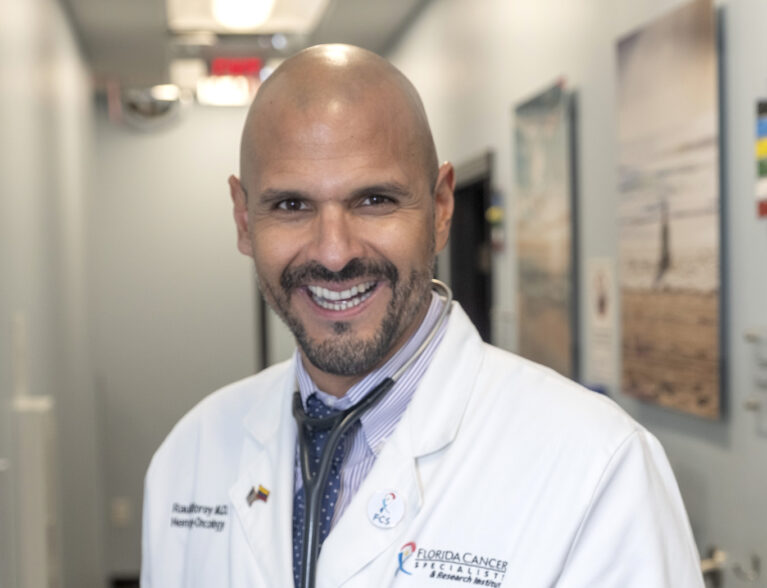
A newly-released study has found that giving chemotherapy to patients with locally advanced cervical cancer before their standard treatment regimen begins can boost overall survival rates by 39 percent, according to Medical News Today.
Dr. Raul Storey, an oncologist with Florida Cancer Specialists & Research Institute in Vero Beach and Melbourne, says this revolutionary approach should be considered the new standard in the treatment of this type of cancer.
He adds, “It can be administered by a general oncologist, although getting a second opinion is always best and working or consulting with an oncologist with a sub-specialty in the field is ideal.”
According to the American Cancer Society, locally advanced means that the cancer has spread beyond the part of the body it began in, but has not yet reached other organs.
Dr. Storey explained that for the new study, researchers gave 500 women with locally advanced cervical cancer five weekly cycles of the chemotherapy drug cisplatin combined with radiation, a combo that is current standard care.
However, before starting this regimen, half of the women were randomly assigned to receive six weeks of so-called induction chemotherapy treatment with two drugs, carboplatin and paclitaxel.
With this induction chemotherapy, 80 percent of patients survived for five years, according to study results published in the Annals of Oncology.
The trial enrolled patients with newly diagnosed cervical cancer at various stages. Patients had to be fit for chemotherapy and radical radiotherapy, with adequate renal, liver and bone marrow function. Adds Dr. Storey, “All chemo has potential side effects and it is impossible to know beforehand how a specific patient will react. But selecting patients who are healthy enough to tolerate it increases chances for a successful outcome.”
The Mayo Clinic describes cervical cancer as a growth of cells that starts in the cervix, the lower part of the uterus that connects to the vagina.
Various strains of the human papillomavirus, also called HPV, play a role in causing most cervical cancers. HPV is a common infection that’s passed through sexual contact and typically prevented by the body’s immune system from doing harm. In a small percentage of people, however, the virus survives for years, contributing to the process that causes some cervical cells to become cancerous.
The American Cancer Society estimates there were 13,960 new cases of invasive cervical cancer diagnosed in the U.S. in 2023; from those, approximately 4,310 women will die.
Dr. Storey stresses that it’s important to have annual Pap smears to aid in detecting cancer in its early stages. Medical authorities suggest strongly suggest receiving a vaccine to protect against HPV infection, as well.
In addition to getting the vaccine, other steps you can take to lower your risk are being a non-smoker or stopping smoking and using condoms.
If your mother or sister had cervical cancer, your chances of developing the disease are higher than if no one in the family had it. Some researchers suspect that in rare instances this familial tendency is caused by an inherited condition that makes some women less able to fight off HPV infection than others.
Cancer.org states that virtually all cases of cervical cancer are caused by HPV – just a few rare types are not. Since there is not a suitable screening test for these rare pathologies – neither the Pap test nor a cervical screening test are able to detect them – it’s important to know the warning signs that something is amiss.
Warning signs for early stages of the disease, regardless of cause:
- Abnormal vaginal bleeding, such as bleeding after vaginal sex, bleeding after menopause, bleeding and spotting between menstrual periods, or having periods that are longer or heavier than usual. Bleeding after douching may also occur.
- An unusual discharge from the vagina − the discharge may contain some blood and may occur between your periods or after menopause.
- Pain during sex.
- Pain in the pelvic region.
Warning signs for more advanced stages of the disease: - Swelling of the legs.
- Problems urinating or having a bowel movement.
- Blood in the urine.
Dr. Raul Storey-Rojas attended medical school at Universidad De Carabobo (UC) – Valencia, Venezuela, and completed his residency and fellowship at University of Louisville, James G. Brown Cancer Center. He is board-certified in medical oncology and internal medicine and is affiliated with American Society of Hematology and American Society of Clinical Oncology. He served as research project coordinator for an oncology group in Houston at the beginning of his career, and during his residency and fellowship he gained experience with the MD Anderson Cancer Center and Bone Marrow Transplantation and Cellular Therapy Department. He can be reached at Florida Cancer Specialists & Research Institute, 3730 7th Terrace, Vero Beach: 772-567-2332; or in Sebastian at 13060 U.S. 1: 772-589-0879.



